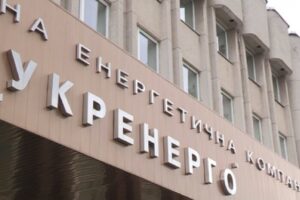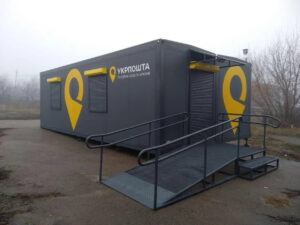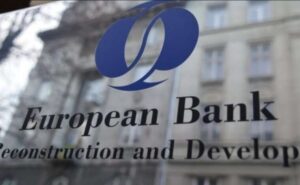
The European Bank for Reconstruction and Development (EBRD) plans to provide a loan of up to EUR 50 million to Nova Poshta LLC of the Nova Group of Companies (GC) to finance part of its capital investment program for 2025-2026, with a focus on improving operational efficiency and supporting the company’s development strategy in Ukraine during the war.
“… includes improving physical infrastructure, optimizing and expanding the network, modernizing IT systems, improving energy management, and restoring human capital,” the bank lists the elements of Nova Poshta’s development strategy on its website.
It is noted that the loan will be multi-currency with the possibility of selecting funds in hryvnia and euros and will consist of two tranches: tranche 1 in the amount of EUR 35 million will be reserved from the moment of signing, tranche 2 in the amount of EUR 15 million will be reserved by the bank solely at its discretion.
The total cost of the project, according to the report, is EUR 69.1 million.
The EBRD reminds that Nova Poshta is the leading private postal and courier operator in Ukraine, with a network of more than 12,000 branches and 27,000 post offices and about 34,000 employees. Every month, the company provides services to more than 11 million customers in Ukraine.
This project, which has passed the final review stage and is awaiting approval, possibly in June, is the fifth in the history of relations between Nova Group and the EBRD.
It is noted that under the existing loan, in May 2025, the company informed the bank of a planned reduction of about 2,900 employees, which is less than 10% of the total number. The EBRD emphasizes that the analysis of this reduction process confirmed that the client complies with the terms of such collective dismissals stipulated in the loan agreement, provided a detailed description of the reduction process, has an effective grievance system and responds appropriately to them without any litigation, and has an effective process of interaction with the trade union, which is informed about the large-scale restructuring plan that will affect employees throughout 2025.
As reported, last August, the EBRD provided a EUR 70 million loan to Nova Group to finance its investment program for 2024.
According to Nova Poshta’s financial report for the first quarter of 2025, its net consolidated revenue increased by 20.7% compared to the first quarter of last year to UAH 14 billion 333.2 million, while net profit decreased by 21.4% to UAH 567.7 million. The ultimate beneficial owners of the company are Volodymyr Popereshnyuk and Viacheslav Klymov.
As noted by the Standard Rating agency, as of the beginning of April this year, with total accounts payable of UAH 13.51 billion, Nova Poshta used, in addition to long-term bank loans, resources raised from the issue of two series of bonds – E and F series of UAH 1 billion each.

The State of Serbia has signed an agreement with the European Bank for Reconstruction and Development (EBRD) to receive a loan of €50 million. The funds will be used to modernize centralized heating systems and improve their energy efficiency in various cities across the country.
The project aims to reduce energy consumption and harmful emissions, as well as operating costs for heat supply companies. The authorities emphasize that both institutions and ordinary consumers will feel the benefits.
As noted by Finance Minister Sinisa Mali, the signed agreement confirms Serbia’s strong commitment to the “green transition.” According to him, the project involves the reconstruction of heating substations, replacement of pipelines, installation of automation systems, and in some cases, the transition to environmentally friendly energy sources such as biomass or solar collectors.
Minister of Mining and Energy Dubravka Djedovic Handanovic added that the implementation of the project will ensure stable and high-quality heat supply in winter and will also help reduce dependence on imported energy sources.
The project will be part of a broader program to modernize municipal utilities, which the EBRD has already supported in the past. According to preliminary estimates, the modernization will reduce energy consumption by 25-30% in the upgraded systems.
EBRD representatives said they consider Serbia a key partner in the Balkans and will continue to finance sustainable projects in the energy, transport, and infrastructure sectors.
Source: https://t.me/

Changes made by the Ministry of Energy to the charter of NEC Ukrenergo with a provision on a qualified majority of votes for the appointment of the chairman of the board, has provoked a sharp reaction from the company’s creditor, the European Bank for Reconstruction and Development, threatening the loss of access to a €141 million loan and grant, as well as early repayment of the €533 million already received, according to Maksym Khlapuk, a member of the Verkhovna Rada’s energy committee (Holos).
“The Ministry of Energy has pushed Ukrenergo into a real, not technical, default. The amendments to the company’s charter, which the Ministry of Energy introduced to strengthen its influence over it, have already hit the financial stability of the critical energy infrastructure operator. Yesterday, the EBRD, referring to the Ministry of Energy’s order on amendments to the charter, emphasized its right to suspend the disbursement of loan funds and demand early repayment of the loan already provided,” Khlapuk wrote on his Facebook page on Saturday, publishing an excerpt from the EBRD’s letter to Ukrenergo and the Ministry of Finance of Ukraine dated June 6.
It points to the company’s failure to notify the bank in a timely manner of any changes to the charter and to provide an opportunity to comment on them.
Referring to the terms of the loan agreements, the bank emphasizes its right to suspend disbursements and send appropriate notices of early repayment of loans in connection with changes to the charter.
“This situation threatens Ukrenergo not only with the loss of access to further EBRD financing in the amount of EUR 141 million (EUR 77 million of unutilized loan balance and EUR 64 million of expected grant), but also with the need for early repayment of funds already received in the amount of EUR 533 million,” emphasized a member of the Rada’s energy committee.
He also notes that the restructuring of Ukrenergo’s debt obligations to holders of green sustainable development bonds, for which the company planned to raise $430 million on international capital markets under the DFC guarantee, is now under threat.
“This debt management operation should have been completed in early July, but its success directly depends on the support of international financial institutions. And, according to my information, the DFC has currently suspended any actions related to the restructuring of green bonds,” Khlapuk emphasized.
As reported, on May 19, the Ministry of Energy amended the charters of LLC “OGTSU” and “Ukrenergo” with a provision on a qualified majority of votes of the Supervisory Board for the appointment of managers instead of a simple majority. This means that four out of five members of the supervisory board (three of whom are independent) must vote for the head of OGTSU, and five out of seven (four of whom are independent) must vote for the head of Ukrenergo.
As commented to EnergoReform by the head of the Association for Energy Efficiency and Energy Saving, former head of the Department for State-Owned Enterprises and Corporate Rights of the State Property Fund of Ukraine, Oleksandr Vizir, the Ministry of Energy, as a shareholder of Ukrenergo had the right to amend the company’s charter, and the provision on a qualified majority of votes is completely legal from a legal point of view. However, he drew attention to the way in which this was done. “For example, as far as I know, the amendments to the charter were not agreed with the supervisory board of Ukrenergo, nor with the company’s creditors, which is a condition of loan agreements in most cases,” Vizir explained in a comment. Vizir expressed his conviction that this would also delay the appointment of the chairman of Ukrenergo’s board, which should have taken place long ago, since the members of the supervisory board – representatives of the state and the Ministry of Energy, as the appointing body – can now effectively block the candidacy of independent representatives.
“According to my information, the independent members of the supervisory board and the shareholder have very different views on who should head Ukrenergo. And in fact, changes to the charter regarding the voting structure for appointing the head in the midst of the competition give grounds for concluding that the shareholder cannot agree with the candidates selected by the supervisory board,” Vizir believes.
In his opinion, the Ministry of Energy also had no right to submit the charter for registration or authorize anyone to do so; the charter should have been registered by the head of the company, Oleksiy Brecht, as acting chairman of the board, or by a person with a power of attorney from Ukrenergo.
According to Energorforma, the supervisory board of Ukrenergo was scheduled to meet on June 4, but was unable to elect a chairman of the board.
EnergoReforma’s interlocutors familiar with the situation also pointed out that the Ministry of Energy did not consult with the Energy Community Secretariat on changes to the statutes of Ukrenergo and OGTSU certified by it, which also caused its negative reaction. They noted that the issue of changes to the statutes of the operators is already known to European institutions and creditors, who have asked the Ministry of Energy for explanations, and assumed that a position will be expressed soon. In their opinion, the Ministry of Energy needs to communicate this issue very carefully with all stakeholders and provide very convincing arguments “or abandon the proposed changes in order to save the situation.”
For his part, Ukrainian Energy Minister Herman Galushchenko, during Question Time in the Verkhovna Rada on June 6, explained that the purpose of the changes to the statutes of OGTSU and Ukrenergo was to strengthen the position of company executives vis-à-vis the NR.
“I believe that these changes are actually aimed at something else: to ensure the maximum independence of the supervisory board and to ensure that the relevant managers and members of the management boards can work in order to protect them from dismissal or other decisions by a majority vote,” he said.
The new supervisory board of Ukrenergo, formed at the end of 2024, includes Yuriy Boyko, Anatoliy Guley, and Oleksiy Nikitin as representatives of the state, as well as independent members Patrick Greichen, Luigi De Francisci, Jan Montell, and Eppe Kofod, who heads the NR.
NR Ukrenergo announced a competition for the position of chairman of the board on February 5, 2025, with applications accepted until March 14 inclusive.
A shortlist of three candidates for the position of chairman of the board was formed in mid-April. It included the acting head of the company, Oleksiy Brecht, its chief dispatcher and member of the board, Vitaliy Zaychenko, and another representative of the company, Ivan Yurik, who deals with Eurobond issues.
In connection with the submission by OGTSU CEO Dmitry Lippa of a statement on the early termination of his powers, the company will be temporarily headed by a member of the management board, operations director Vladislav Medvedev, until the completion of the competitive selection process. The deadline for accepting applications from candidates for the position of the next head of OGTSU was March 31.

Ukrproduct Group, a major Ukrainian producer of packaged butter and processed cheese, reported a net loss of GBP 2.04 million for 2024, compared with a net profit of GBP 0.39 million in 2023.
“Financial expenses in 2024 increased by 253% compared to the previous year to GBP 2.8 million, which was caused by significant accruals of commission for deferral on a loan from the EBRD, applied retrospectively for the period from October 2016 to December 2024,” the company explained in its annual report on the London Stock Exchange.
According to the report, in December 2024, the European Bank for Reconstruction and Development (EBRD) decided to exercise its right under the loan agreement and charged a commission of GBP 2.0 million, increasing the company’s liability to the bank to GBP 8.1 million.
The group’s gross profit for the past year increased by 3.9% to GBP7.12 million, while operating profit fell by 36.6% to GBP1.08 million, and EBITDA by 29% to GBP1.7 million.
As for Ukrproduct’s revenue, it grew by 13% in hryvnia over the past year, while in British pounds sterling, the increase was only 0.2% to GBP37.08 million.
“The processed cheese segment generated revenue of GBP 21.2 million in 2024, down 15% from the previous year. This was largely due to a reduction in price promotions at the national level due to rapid cost increases caused by sharp fluctuations in the dairy raw materials market and the risk of loss-making sales,” the company explained.
According to the report, the butter segment achieved revenue of GBP 5.2 million in 2024, compared to GBP 3.1 million in the previous year. This 70% growth was primarily driven by increased production following a period of slight stagnation, with the market becoming receptive to higher supply.
Sales of spreads fell by 12% to GBP 4.0 million, reflecting increased competition in the market and changing consumer preferences.
Ukrproduct recalled that in the fourth quarter of 2023, it expanded its range of products with a longer shelf life to include a new category of sandwich spreads, which showed profitable growth: sales in 2024 amounted to GBP 1.2 million.
Sales of skimmed milk powder increased by 8% last year to GBP 1.4 million, but declined by 23% in volume terms. It is noted that prices for skimmed milk powder had only limited upside potential in 2024, and the group minimized the release of this product for sale in favor of using semi-finished milk protein as an ingredient in the production of processed cheese.
Sales of kvass and other beverages increased by 31% year-on-year to GBP 2.3 million in 2024, thanks to positive kombucha sales dynamics, supported by new product launches and strong brand positioning.
Ukrproduct noted that administrative and commercial expenses in 2024 increased by 4% year-on-year to GBP4.2 million.
This increase was mainly due to higher payroll and related expenses, as well as higher insurance and consulting expenses. Other operating expenses increased to GBP 1.8 million in 2024 compared to GBP 1.1 million in the previous year.
In light of the expected deterioration in the business outlook and increased future risks, the group recognized a net impairment loss of GBP 1.1 million on financial assets, reflecting provisions made for receivables and prepayments to suppliers. In addition, this line includes a write-off of goods in the amount of GBP 0.1 million and a provision of GBP 0.4 million for blocked VAT invoices.
Ukrproduct’s net assets as of December 31, 2024, amounted to GBP 2.0 million, down from GBP 4.5 million a year earlier, while cash balances decreased to GBP 0.1 million.
According to the agricultural holding, it has been in dialogue with the EBRD since 2021 regarding the potential restructuring of the loan and accrued interest and fees, and discussions are ongoing. At present, the EBRD has not taken any action to accelerate the repayment of the accumulated loan.
Assessing its prospects for 2025, Ukrproduct assumes that the business environment will remain unstable due to the ongoing war in Ukraine and financial pressure.
“The Group will continue to pursue a prudent capital allocation policy, prioritize liquidity preservation, seek new financing opportunities, and focus on meeting its existing commitments.
EBRD, LOAN, LOSS, UKRPRODUCT

Ukrposhta JSC will receive EUR600 thousand for the installation of modular branches from the European Bank for Reconstruction and Development’s (EBRD) Special Crisis Response Fund, the company’s press service said.
According to the company’s announcement on Tuesday, the grant was provided in support of a EUR63 million loan already granted to Ukrposhta by the EBRD.
The company emphasized that the modular branches can be quickly installed in place of stationary branches that have been destroyed or damaged by enemy shelling.
“Modular offices will also be installed in settlements “cut off from the world” – with barrier-free access, equipped with Starlink and generators, they will become an island of stability for Ukrainians,” Ukrposhta said in a statement.
In addition, it is reported that in the modular branches it is possible to send a parcel within Ukraine and abroad; pick up ordered medicines; make a transfer or pick up funds sent by loved ones; subscribe to publications; pay utility and other bills; receive a pension.
The donors of the EBRD Special Crisis Response Fund are Canada, Denmark, France, Germany, Italy, Japan, the Netherlands, Norway, the Republic of Korea, Switzerland, the United Kingdom and the United States.

The European Bank for Reconstruction and Development (EBRD) plans to invest at least EUR1.5 billion ($1.56 billion) this year to support Ukraine’s economy and businesses during the war, Reuters wrote on Thursday, citing the bank’s president Odile Renault-Basso.
She said the bank will focus on Ukraine’s private sector, especially the energy sector after repeated Russian attacks on the power grid and other infrastructure. “Our plan is to continue this level of investment. At a minimum, we are aiming for 1.5 billion euros of investment, but if we can do more…, we will,” Reno-Basso told reporters.
She also said that the bank’s activities are demand-driven and the EBRD is ready to increase its investments in Ukraine to about EUR3 billion a year after the war ends.
Renaud-Basso added that Ukraine’s energy sector was a key priority this year and also in the future, as projects to modernize the sector and develop renewable energy could drive private investment after the end of the war.
“There is a lot of potential, so this will generate a lot of interest from foreign investors and it will generate a lot of activity in the country – it will really drive the growth dynamics,” she said.
Renault-Basso reportedly met with Ukrainian President Volodymyr Zelensky and other officials during her visit to Kiev on Thursday. They discussed banking, logistics, and support for Ukrainians.
Since the start of the full-scale invasion, the EBRD has disbursed EUR6.2 billion to Ukraine, notably EUR2.4 billion last year.